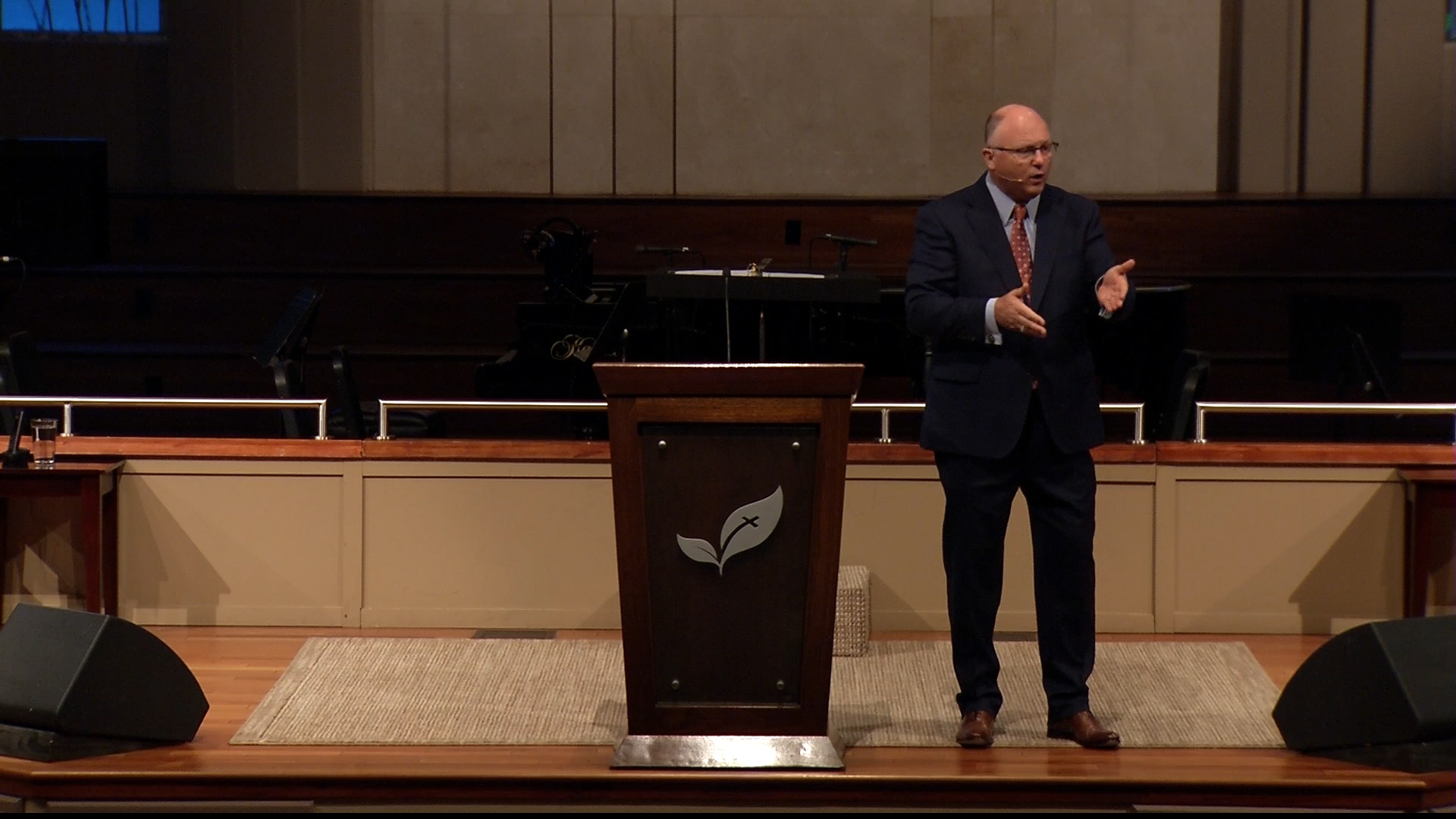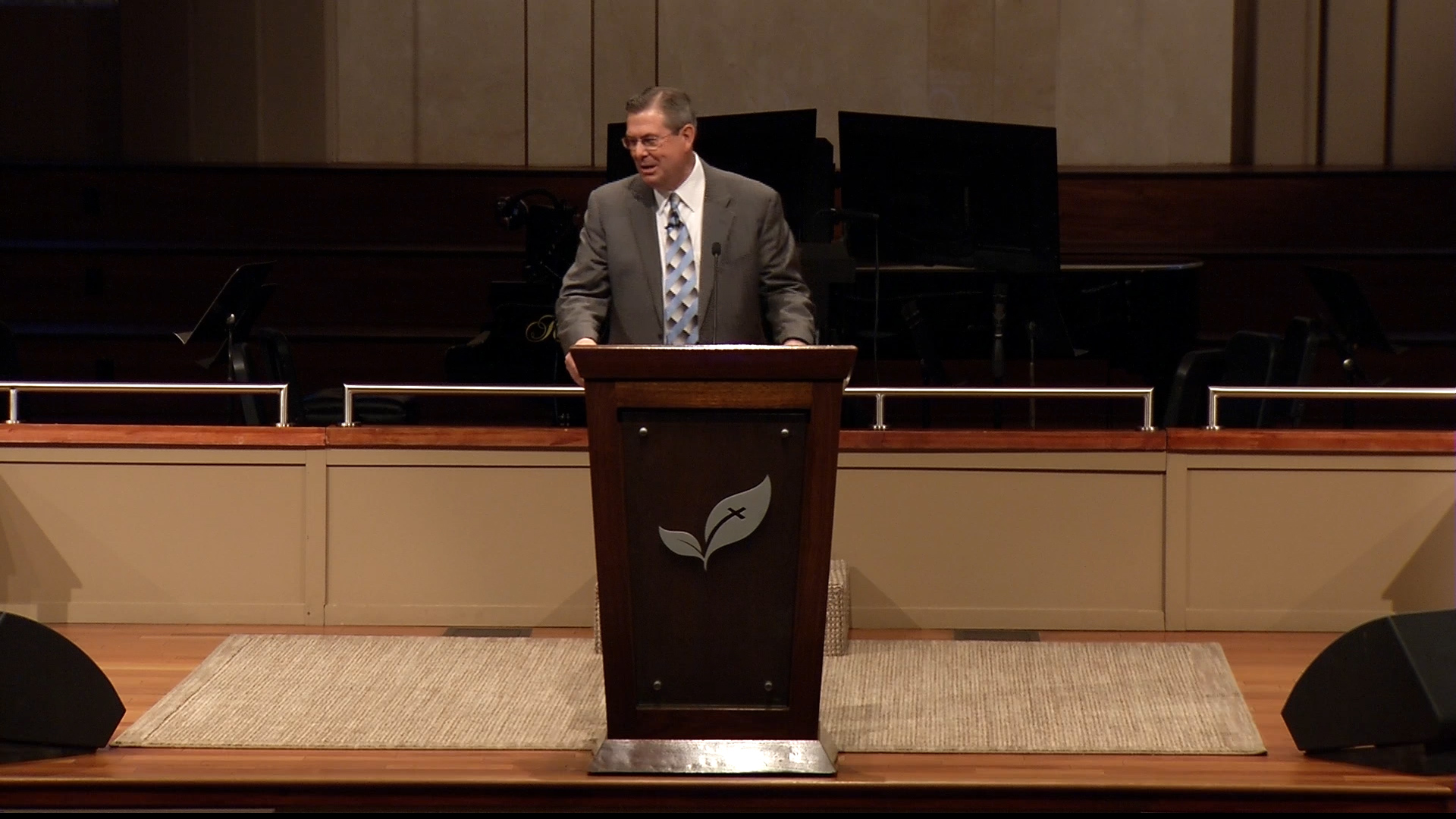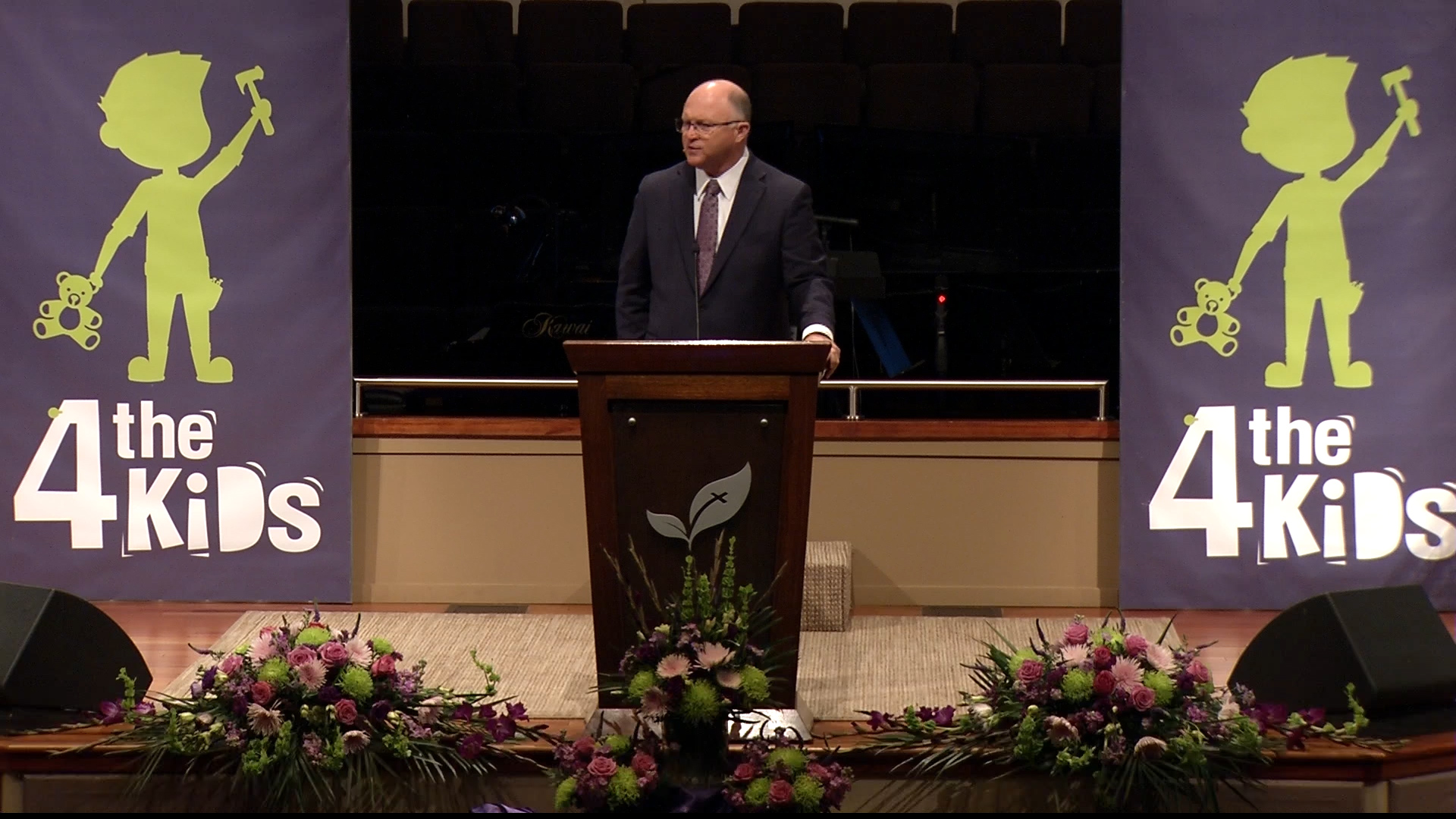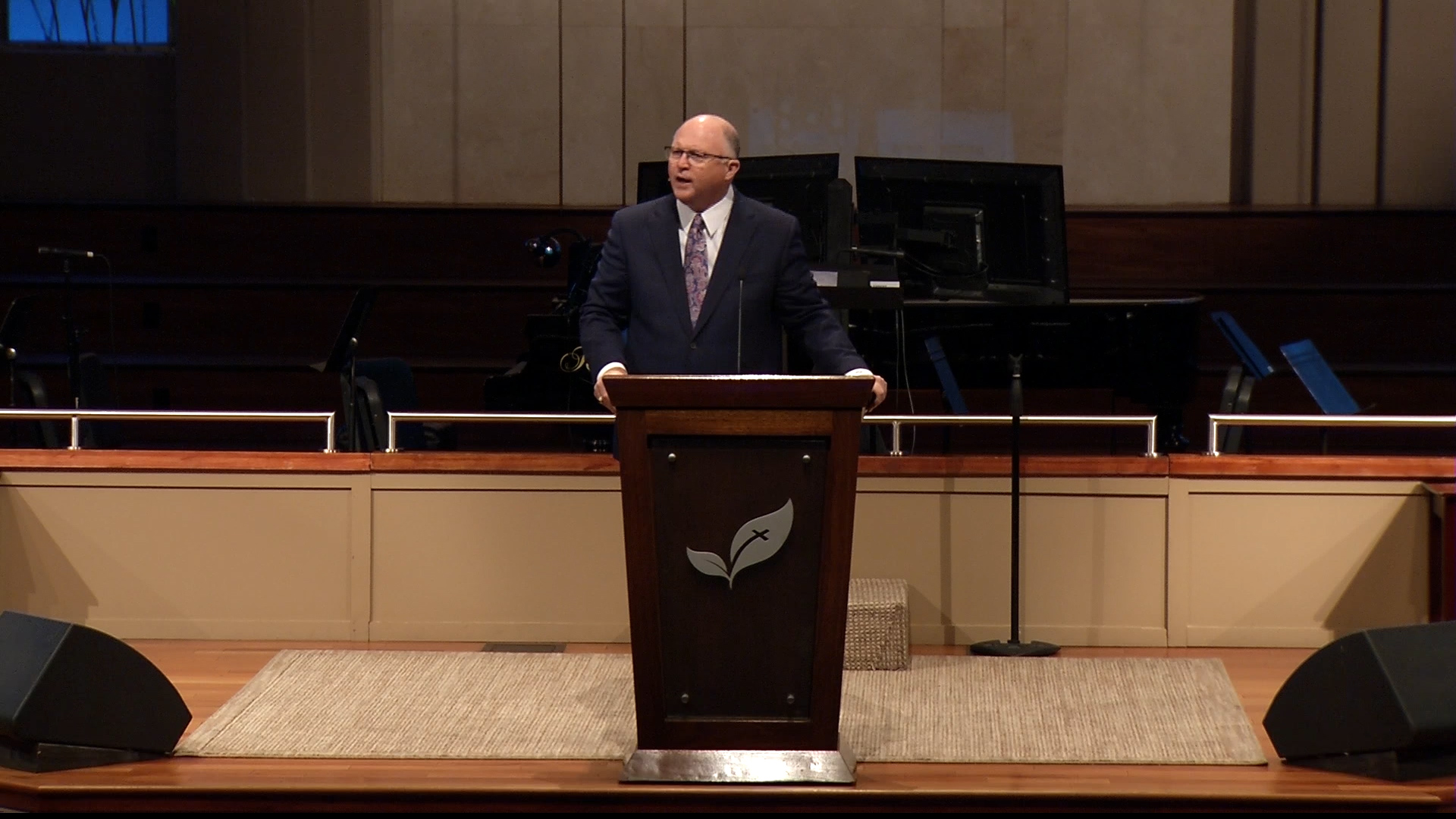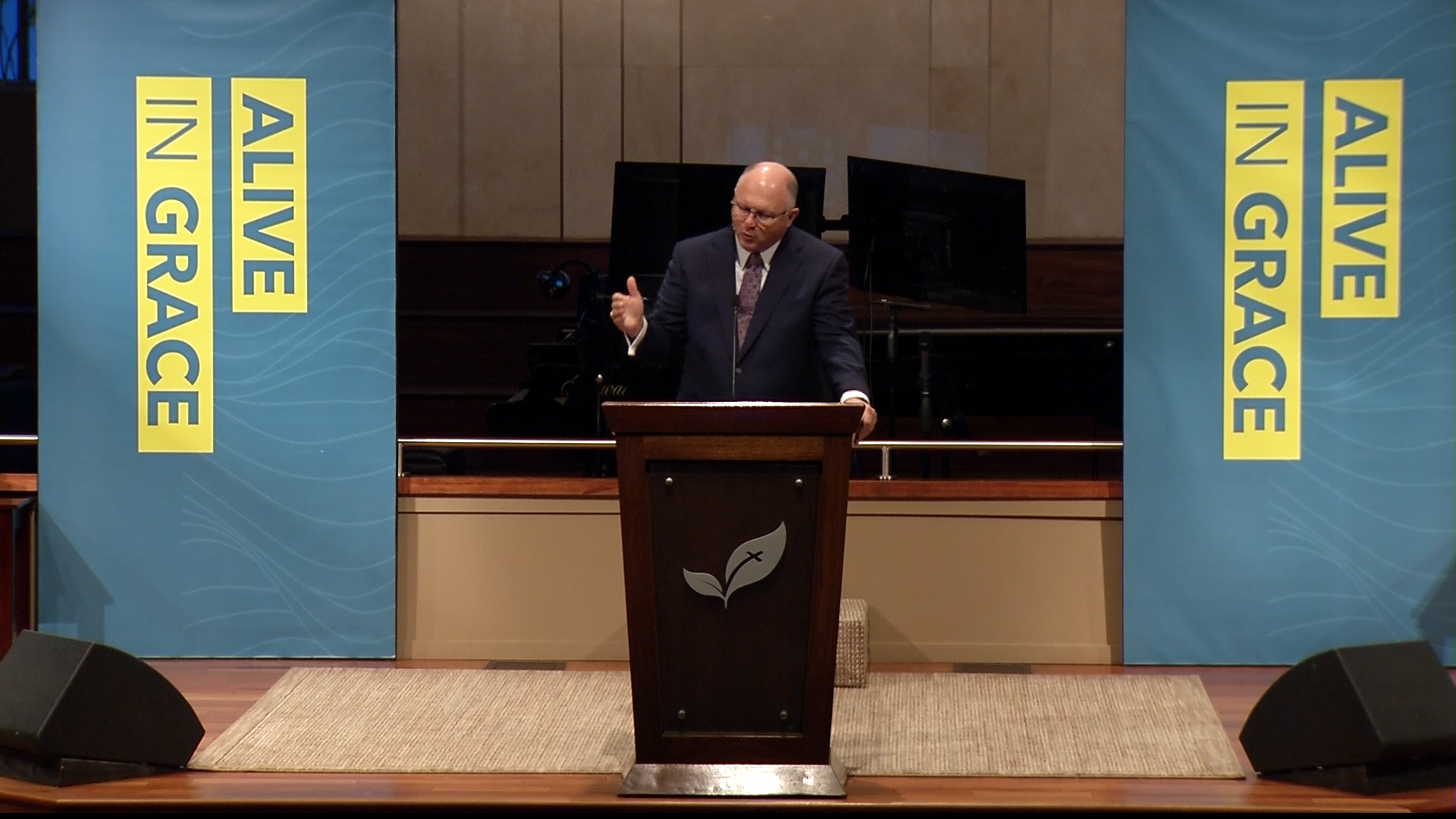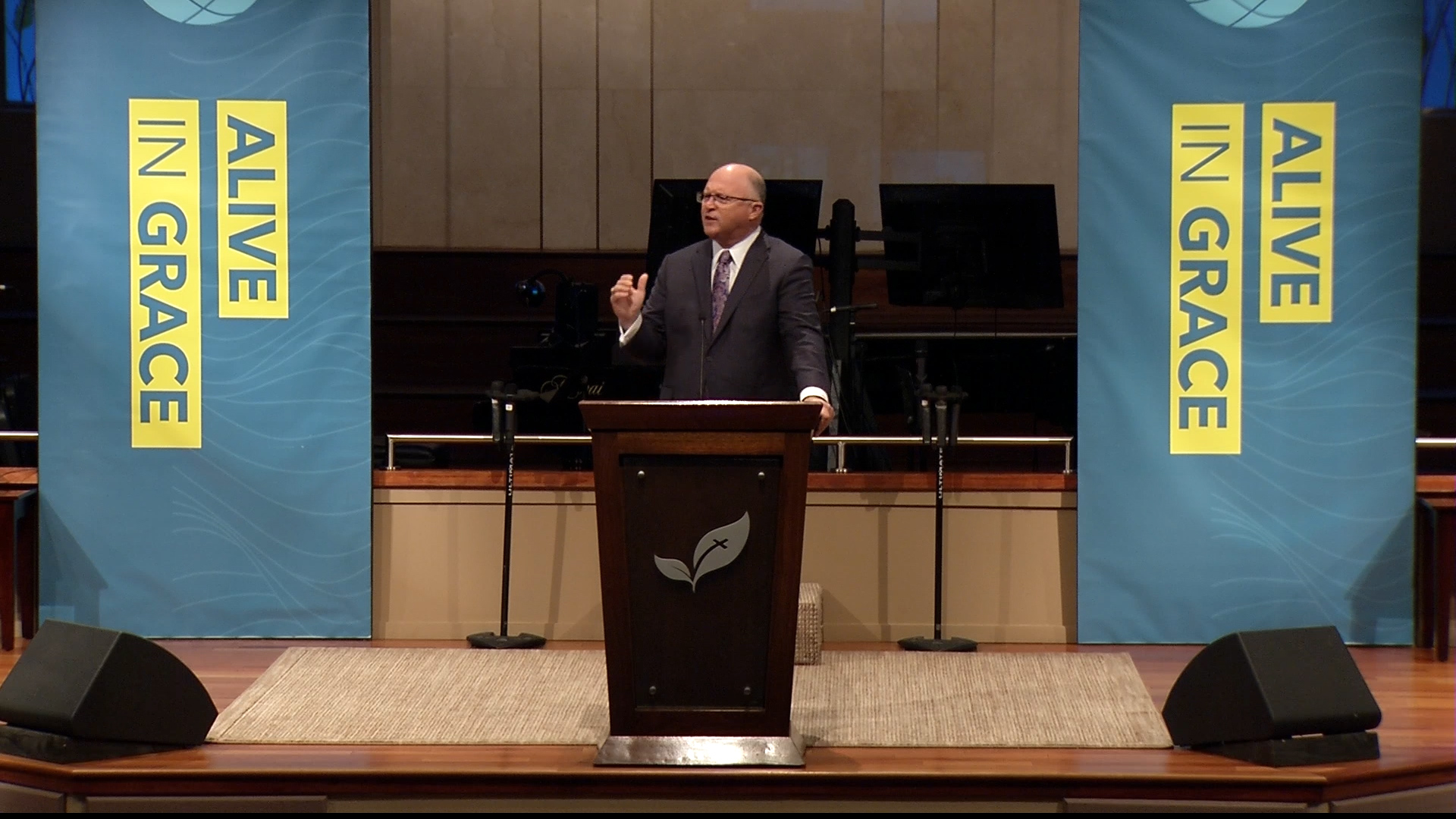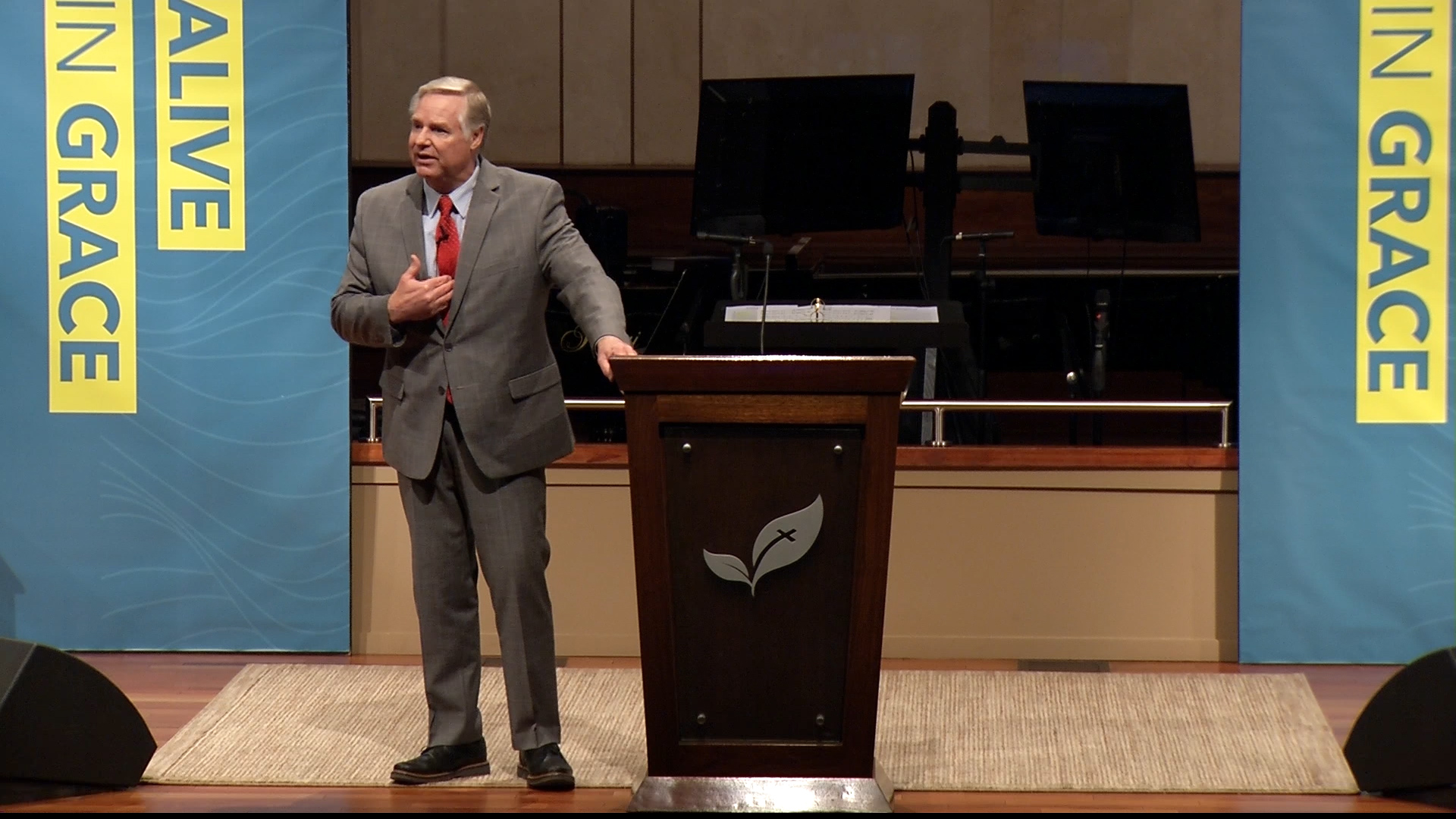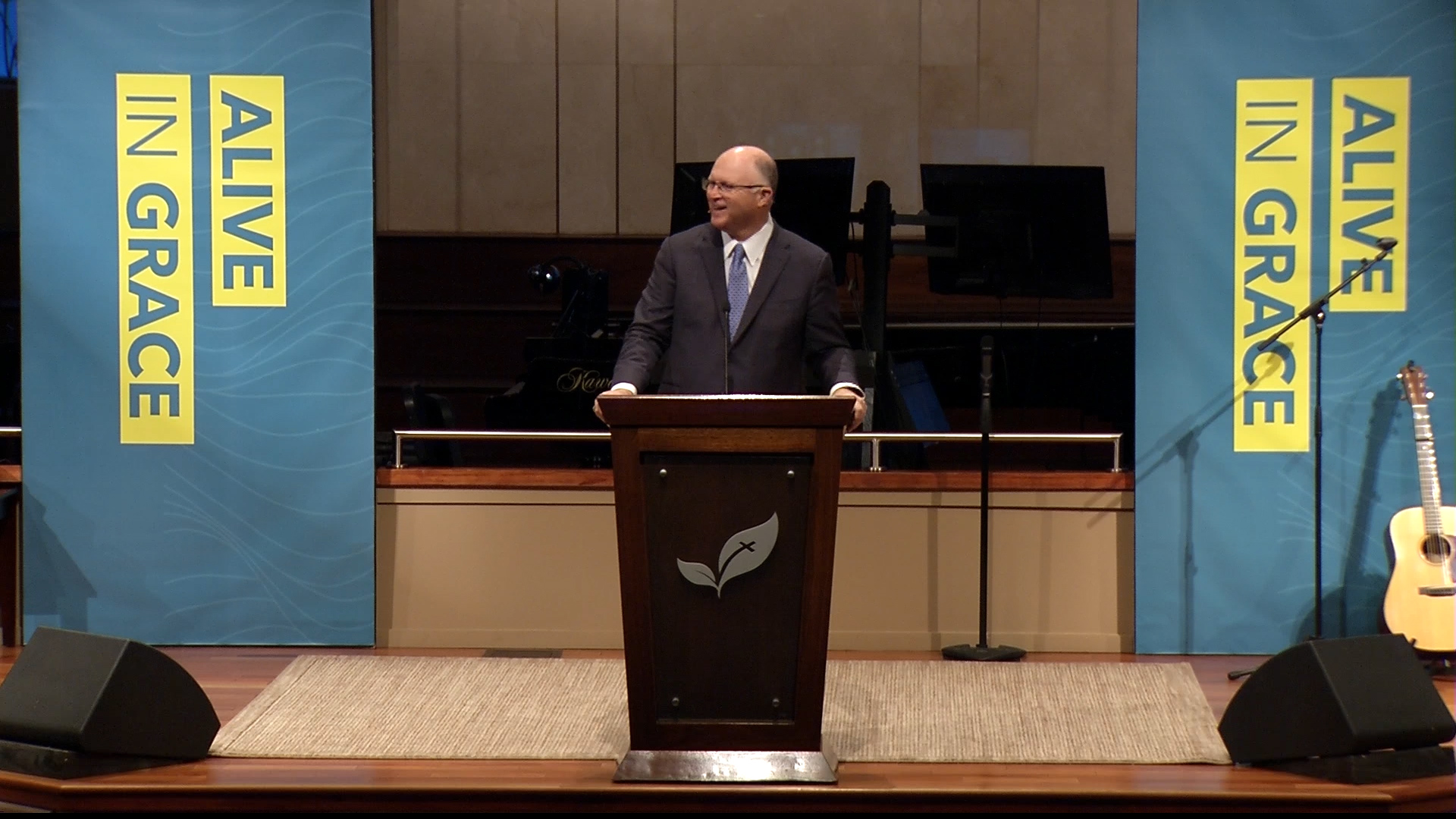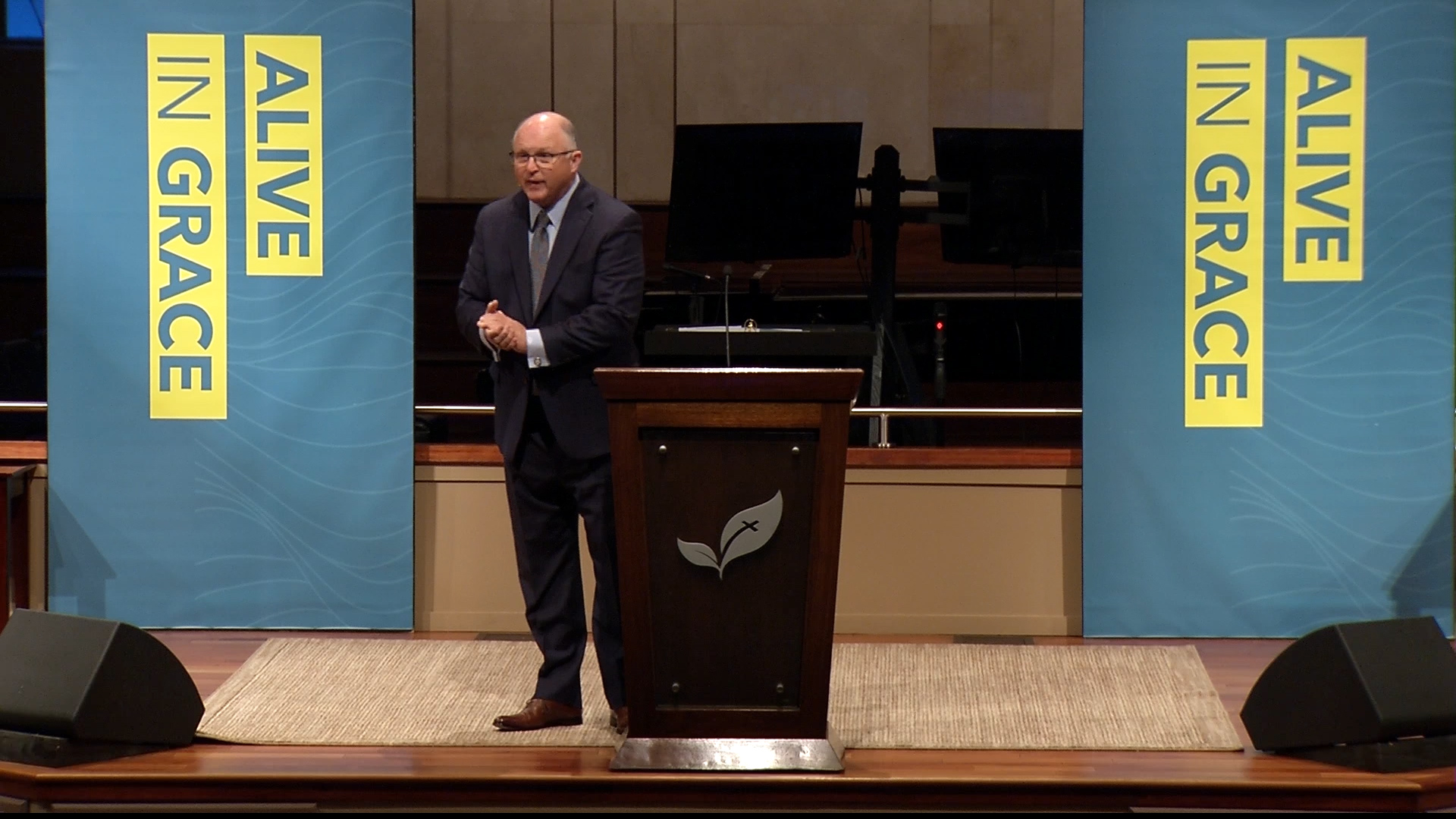First Corinthians 15 is one of those high mountain portions of the Scripture. All Scripture is given by inspiration of God. But this is one of those points in the Bible where you just kind of pause and you gaze at the power and majesty of God. And I want you to do that with me right now as we read this, 1 Corinthians chapter 15, and we're going to begin reading in verse 1 and read down through verse 10.
"Moreover, brethren, I declare unto you the gospel which I preached unto you, which also ye have received, and wherein ye stand; by which also ye are saved, if ye keep in memory what I have preached unto you, unless ye have believed in vain. For I delivered unto you first of all that which I also received, how that Christ died for our sins according to the Scriptures; And that he was buried, and that he rose again the third day according to the Scriptures: And that he was seen of Cephas, then of the twelve: after that, he was seen of above five hundred brethren at once; of whom the greater part remain unto this present, but some are fallen asleep. After that, he was seen of James; then of all the apostles. And last of all he was seen of me also, as of one born out of due time. For I am the least of the apostles, that am not meet to be called an apostle, because I persecuted the church of God. But by the grace of God I am what I am: and his grace which was bestowed upon me was not in vain; but I laboured more abundantly than they all: yet not I, but the grace of God which was with me."
How many of you want that grace with you in your life? Amen. That's what I want in my life. And so let's pray. We're going to hear a beautiful song about the grace of God, and then we'll jump right into this passage of Scripture this morning.
Father, we thank and praise you this morning for the wonderful grace of Jesus, and we ask you, Lord, that you would fill us, each of us, with your Spirit and with your grace, because we know that we cannot be alive in Christ unless we are obedient to your Spirit and your guidance. Now, Lord, we pray that each of us in these next several weeks as we grow in grace would be strengthened and that we would labor more abundantly because of your grace, not because of our own motivation or because of our own thoughts or ideas, but because you work in us, Lord. Then work through us I pray, and I ask this in Jesus' name. You may be seated.
We live in a day of amazing confusion, confusion over the very basic things. It seems like people are confused about even male and female. People are confused about marriage. People are confused about just the very basic things, and we see the gender identify confusion often brought about by the media and the wickedness of the media. We see the identity confusion sometimes enhanced by broken homes and situations of mobility, and we counsel with young people who just don't know where they fit in, and they don't know how to identify. And many times the gangs and other elements are ready to pull young people in who are struggling with really their identity and how to belong.
We see in this society today an epidemic even of something called stolen identity, and people that are told, "Be careful, don't leave your credit card slips in a garbage can. Somebody might take it out and they might steal your identity." Just curious; has that happened to anyone in the auditorium? Let me see where you are. All right, probably 50 people just raised their hands, and they're not sure who they are as they sit here this morning; their identity's been stolen from them.
Probably the greatest example of stolen identity was the CEO of LifeLock Todd Davis who was so 100 percent confident in his ability to protect identity and to protect credit that he actually shared his social security number on television, and he challenged anybody to try to steal his identity. And within just a few days one man used Davis' identity to take $500.00 on a cash advance loan, and 87 other people had stolen his social security number with using names like Joe Blow and Jabba T. Hut and other very unusual names.
The fact of the matter is that there is a problem with people losing their identity in this country today. But in a day of identity confusion and lost identity, we come to a passage this morning and we hear a man of God, an apostle, a redeemed man who makes this statement that strikes me. He says, "I am what I am by the grace of God."
Now there are those who are still searching, trying to find out who they are, trying to get in touch with their inner self. And I heard one lady who said, "I finally got in touch with my inner self," and she was just as confused as I am. So there are people like that, you know, they're trying to get in touch with their inner self. And there are people who are getting involved in all kinds of weird and ungodly relationships, throwing themselves sometimes into situations of even danger trying to find out who they are.
But when you meet Jesus Christ and you understand grace, you're able to say with the apostle Paul, "I am what I am." And we'll see what that means in a moment. "I am what I am by the grace of God."
How many of you hear the contentment in that statement? You hear a man who has come to grips with it all by the cross of Jesus Christ. He's no longer worried about advancing himself, no longer worried about finding the acceptance of his peers. He has come to a place where he says, "I am what I am by the grace of God."
Now 1 Corinthians 15, as I said a moment ago, is one of those pinnacle passages in the Bible, and it is here that we find emphasized the death, burial, and resurrection of Jesus Christ, the centerpiece of Christianity. The apostle Paul is emphasizing of the gospel in these first few verses. In fact, by way of introduction, notice in verse 1 he says, "Moreover, brethren, I declare unto you the gospel which I preached unto you, which also ye have received, and wherein ye stand; by which also ye are saved, if ye keep in memory what I preached unto you, unless ye have believed in vain."
In other words, I believe there are some that just say words. There are some that just kind of went through some motions. Paul said, "Look, if you believe what you said when you got saved, if you really meant that you were a sinner and that Jesus died for your sin, then you did not believe in vain, but this was a legitimate, wonderful, and glorious decision that was made."
And so, we see very quickly in the introduction this morning, these first two verses, how grace is received in one's life. And it's a very simple formula. But notice it in verse 1, the gospel must be declared. "Moreover, brethren, I declare unto you the gospel."
We've often said that buildings don't change lives, but what happens in them changes lives. And thank God that in every building on this campus, the gospel is declared regularly. That's the purpose of Lancaster Baptist Church, to preach the gospel of Jesus Christ. And how sad to think that in some worship houses today Christ will not be declared as the way, the truth, and the life. So the gospel is declared.
Secondly, though, the gospel must be received, you see. Thank God for faithful preachers who declare it. But notice in verse 1, it also says, "which also ye have received." How many of you remember the day when you received the gospel, you accepted Christ as your Savior. Do you remember that day? All right. All right, we're on a good track here today, because that's the day that grace became real to you in your life. The gospel was declared; the gospel is received. It is the power of God unto salvation. And when the gospel is received, at that very moment your soul is saved.
Now, friends, the Bible teaches in 1 Thessalonians chapter 5 that we are a trichotomy. That is to say we are body, soul, and spirit. And God says that he breathed into Adam and Adam became a living soul. And your soul will live eternity in either heaven or hell. And the Bible declares that when someone receives Christ as their Savior that their soul is saved, or set apart, and one day, by the way, will be reunited with a redeemed glorified body.
But notice, if you would, in verse 2, the Bible says, "By the which also ye are saved." Let's say that word together: "Saved. Saved."
Let me tell you something I've discovered after being saved for these past however many years I think – oh, boy, lots of years, lots of decades. I've discovered this: people that are saved know they are saved. Right?
So I've been saved for 46 years. I've met people along the way, and as a soul-winner, as a pastor, I talk to them about Jesus, and sometimes I'll say to them, "Tell me, when were you saved?" and they'll talk about when they got into a church. Lots of people talk about when things in their life were bad and then they got good, and they'll talk about some traumatic experience or seeing a light at the end of their hospital bed, none of which has anything to do with being saved.
You cannot separate the death, burial, and resurrection of Jesus Christ from your salvation experience, because faith cometh by hearing and hearing by the word of God. But when the gospel is delivered and when someone believes, then by grace they are – what's the word? – saved. All right. So this is how grace is received: it is received when someone is saved.
Now as we think about this, I want you to just pause with me this morning then and just contemplate and meditate on, first of all, the price of grace, the price of grace, because the price of grace is the cross of Calvary. And I want you to just see foundationally with me this morning that grace always goes back to the cross. Now whether that's salvation – listen, you're not saved without the grace of the cross – whether that's service, the love of Christ should constrain you.
We shouldn't sing in the choir because the choir director twists our arm, we should do it because of the cross. Can I get an amen? "Amen." Whether that is our singing, we sing to the Lord because of the joy of the cross. Whether that is our giving in the offering, we give by grace based upon what happened at the cross. So all things pertaining to grace are centered in the gospel of Jesus Christ.
Now the basis of grace always goes back to the cross. Let me give you one illustration of that. In your notes, Ephesians chapter 4 and verse 32, it says, "And be ye kind one to another, tenderhearted, forgiving one another, even as God for Christ's sake hath forgiven you."
Now here we see a commandment to forgive one another, but the basis of that commandment is that God, for Christ's sake, hath forgiven us. So the basis of our forgiving of others goes always back to the cross. The basis of my serving others goes back to the cross. The basis of all we do in the Christian life goes back to the cross. So we see the price of grace.
I want you to notice, first of all, it was a personal price. The Bible says here in verse 3, and I want you to see, if you would, turn in your Bible to 1 Corinthians chapter 15, and notice in verse 3 this personal price that Christ paid: "For I delivered unto you first of all that which I also received, how Christ died for our sins according to the Scriptures."
Now the payment for sin was death. Christ then became our payment when he died upon the cross. He went to Golgotha just outside the city of Jerusalem known as the hill of the skull. It is in the area today known as the West Bank. And it is upon this hill where Jesus Christ hung suspended between two common thieves. And there on that cross his blood was shed for you and for me.
This was a prophesied death, it did not take Jesus by surprise. The Bible says in Psalm 22:14, "I am poured out like water, and all my bones are out of joint: and my heart is like wax; it is melted in the midst of my bowels. My strength is dried up like a potsherd; and my tongue cleaveth to my jaws; and thou has brought me into the dust of death. For dogs have compassed me: the assembly of the wicked have inclosed me: they have pierced my hands and my feet."
And that is exactly what happened to Jesus Christ as he was suspended on the cross and paid the price of grace. He died for sin he had never committed. He died for sin he did not know. He was tempted in all points like we are, but he never sinned. And yet by grace, he shed blood that would cover all of your sin and all of mine. This was the price of grace. It was the blood of Jesus Christ. "He was wounded for our transgressions, he was bruised for our iniquities: the chastisement of our peace was upon him; and with his stripes we are healed." And so he died for our sins. And we see this as the very foundational truth of the gospel.
But then the Bible says here in chapter 15, we see the Bible tells us not only was he delivered up to die for our sins, verse 4 says that he was buried, he was buried. Now it is certain that Christ was dead, or else they would not have placed him in a tomb for burial. There are those liberal seminaries, so called, that have taught, and there are those skeptics and those so called higher critics who have said, "Oh, Jesus just swooned for a while. He was just in a coma maybe. But there's no such thing as the literal resurrection."
Let me just say something: you don't take someone who's fainted but still breathing or still having a pulse and bury them. The Bible says that Jesus was buried. And the Bible tells us in Matthew 27:58, "He went to Pilate, and begged the body of Jesus. Then Pilate commanded the body to be delivered. And when Joseph had taken the body, he wrapped it in a clean linen, and laid it in his own new tomb, which he had hewn out in the rock: and he rolled a great stone to the door of the sepulcher, and departed."
Now you can visit the garden tomb. And there are several things that are intriguing to me about it. Not only the proximity to the hill of the skull; but when you go inside the garden tomb you will notice that there is an extra portion of the tomb that has been chipped away or carved out. In other words, the person that was laid in there was apparently taller than the person it had been created for. And I believe that was for the sake of the Lord Jesus Christ who was literally crucified, who was literally buried. It was a very personal price that he paid.
But it was also a very transformational act that took place. I want you to see the transformational side of this verse 4 says, "and that he was buried, and that he rose again the third day according to the Scriptures."
Now thank God this morning for the resurrection of Jesus Christ. How many of you know, we don't have to wait until April to celebrate the resurrection of Jesus Christ? In fact, we celebrate it every Sunday. That's why we worship on the first day of the week; we celebrate the resurrection of the Lord Jesus Christ.
First Peter 1:3, "Blessed be God and the Father of our Lord Jesus Christ, which according to his abundant mercy hath begotten us again unto a lively hope by the resurrection of Jesus Christ from the dead, to an inheritance incorruptible, and undefiled, and that fadeth not away, reserved in heaven for you." Romans 4:25, "who was delivered for our offences, and was raised again for our justification." And so here we see that Jesus Christ provided a wonderful salvation through the death, burial, and resurrection.
But may I say, this year we're not only emphasizing the resurrection of Christ, but also the resurrected life of every single believer. For the Bible says in Romans 6:4, "Therefore we are buried with him by baptism into death: that like as Christ was raised up from the dead by the glory of the Father, even so ye also should walk in newness of life."
Now I get tickled at people that sing about the resurrection power and they talk about the resurrection power, but their life is no different from that person that is unsaved. They walk the same walk, talk the same talk, tell the same jokes, listen to the same music, do the same things, party the same way. They want to talk about grace, they have no understanding of the resurrected power of the grace of God because their life is absolutely no different. We look good on Sunday, but many times our life is not expressing the resurrected power.
And I just want to say to you this morning that we are endeavoring to find the reality and to experience the reality of the resurrected, transformational, life in Jesus Christ, because when you got baptized, you were picturing death to the old life and resurrection to the new life. And sometimes when Christians backslide, they go back to the old life. And God says, "That's what you're supposed to be dead to. You're supposed to be alive to the Lord Jesus Christ."
Now this is a little sign that I got at the Cracker Barrel at Christmastime. I'd like to have a closeup with the camera because I need to help the church here right now. Someone bring a little closeup in here. Bring it in, bring it in, bring it in, bring it in, see if you can get it here, see if we can get it up on the screen.
Can you see what it says? It says, "Can I get an amen?" Now I'm going to work with you just a little bit. I love this sign, it's my favorite sign. God bless the woman that painted this sign. Some of you take a look at it, this is not me, this is Cracker Barrel. Far be it from me to have painted such a sign.
When the preacher's preaching about the resurrection and the new life and death to the old live, we ought not to think, "Oh, ho, he might be saying that we ought not to be going off and partying tonight, drinking our beer at the game or whatever." That's exactly what I'm preaching. God said that we're to be dead to the old life and we're to be alive to the new life in Jesus Christ. Can I get an amen?
You see, God has promised and God has purposed that the death, burial, and resurrection is not only the miracle of Jesus, but it is to be the life of the Christian, and that we are to be alive in Christ, living a resurrected life. Someone says, "Oh, I just want to have just the kind of Christian life that I want to have." You and about ten million other American Christians. And you can have it, too. But I want to tell you something: you're going to settle for second best. There's nothing greater than the life that is found in Jesus Christ.
So the price of our grace; what is the price of that grace? The death, the burial, and the resurrection. And God wants us to live that resurrection as well. And notice, secondly, this morning, the power of this grace. What is the power of this grace?
Look at verse 9: "For I am the least of the apostles, that am not meet to be called an apostle, because I persecuted the church of God. By the grace of God I am what I am." Now Paul the apostle had experienced, perhaps, some would say more than anyone in history, life-changing grace.
Now there are some people that don't want to accept their need for change. I heard recently about a man that went to the doctor and the doctor said, "Look, you've absolutely got to give up red meat." So he has stopped putting ketchup on his hamburgers. It's a start.
There's some people, they don't want to change. There are actually people that come to church, God only knows why, who never intend to change. Folks, I don't know about you; I've got to grow into the likeness of Jesus Christ. And only by the power of grace can we change.
Now God changed the apostle Paul's life. In fact, his name wasn't even the apostle Paul, was it; his name was Saul. Now let's think about the power of this grace. Notice first of all, grace covers the past. Grace covers the past.
Verse 9, he says, "I persecuted the church of God." Now that's an amazing statement. Let's think about that: "I persecuted the church of God." Remember that on the road to Damascus when the Holy Spirit was convicting him, Jesus said, "Saul, Saul, why persecutest thou me?" In other words, when you persecute the church, you are persecuting the Lord Jesus Christ. And the apostle Paul had taken Christians to prison. He had overseen in the taking of their lives. He was a man that hated the church.
In fact, give you a few thoughts; look at Acts 8:1, "And Saul was consenting unto his death." This is speaking about the martyrdom of Stephen. "Saul was consenting unto his death. And at that time there was a great persecution against the church which was at Jerusalem; and they were all scattered abroad throughout the regions of Judaea and Samaria, except the apostles." Verse 3, "And Saul, for Saul, he made havock of the church, entering into every house, and haling men and women committed them to prison."
I'm going to mention tonight about some of the travesties that Chinese believers have been experiencing the last few months, and they've had police come into their church. And some of them as they've taken the hymn books and as they've taken the computers of our missionaries, perhaps some of them just were doing it because that's what they were told to do by their Communist party. But others have been quite rough in the process. Others have cursed and demeaned the Christians, and others have been very cruel to them. And I believe that would be the personality of the apostle Paul.
The apostle Paul I think had a little sick kind of joy in bringing these Christians to jail. Acts 26, notice in your notes, verse 11: "And I punished them oft in every synagogue, and compelled them to blaspheme; and being exceedingly mad against them, I persecuted them even unto strange cities. And when they were fallen to the earth, I heard a voice speaking to me, and saying in the Hebrew tongue, 'Saul, Saul, why persecutest thou me? It is hard for thee to kick against the pricks.' And I said, 'Who are thou, Lord?' And he said, 'I am Jesus whom thou persecutest.'"
Now every once in a while I'll meet somebody who says, "Well, I'm too great of a sinner to get saved." I've had ladies tell me, "I've had an abortion, I cannot be saved." And abortion's a tragic, tragic situation, and terrible situation, and sinful situation of our day. But there is no sin too great that God's grace cannot cover.
I've had people say, "Well, I've lived a very immoral life," or, "I've taken drugs," or all of these different things. And I just want to quickly say grace covers the past. It doesn't matter where you've been, it doesn't matter what you've done. God says, "My grace will cover your past."
And the apostle Paul had literally taken the lives of Christians. Not a candidate, you might say, for membership. Most churches did not perhaps want him to be their member. But God loved him and God provided a way for him. Romans 5:20, "Moreover the law entered, that the offence might abound. But where sin abounded, graded did much more abound."
Let's read that together, shall we, Roman 5:20. Ready, begin: "Moreover the law entered, that the offence might abound. But where sin abounded, grace did much more abound." Let's try that again: "Grace did much more abound." Very good. You ought to say, "Amen, I agree. I'm happy that grace abounded, because were it not for grace, I don't know where I would be," the songwriter said. And so we see the wonderful grace of Jesus.
Now you can try to deal with your sin in your own way. You can act like it's not that bad. You can rationalize it. You can do various different things. I heard of a bank executive, Joseph Talbot, who was arrested last year for intoxicated driving. After his release he literally throughout all of the county he lived in, Wayne County, went to all of these newspaper dispensaries that morning and personally bought more than 1,000 copies of the newspaper so that nobody would see the record that he had been arrested for drunk driving.
Now you could do that. Some of you'd have to buy a lot of papers through your lifetime, wouldn't you? You could buy papers. You could try to erase this and try to erase that. And some people do that; they live their whole life trying to cover. But what we want to see this morning is God has already covered it by the blood of his Son the Lord Jesus Christ. Grace covers the past. There's no sin too great that God's grace does not supersede or conquer through Jesus Christ. Grace covers the past.
Now let's notice then, secondly, grace gives a new identity. And this is our focal point today, our identity in grace, the identity through grace that we have. Verse 10 says, "But by the grace of God, by the grace of God I am what I am."
Now here we see an established identity. And again, sometimes people struggle with this, and they feel unworthy, and they feel like they're not a part, and they don't feel necessarily accepted. I heard about one man who was struggling with some self-esteem issues, and he sat down to write in his journal. He kind of frowned, and he thought for a moment and he began to write. He said, "Dear diary, I'm sorry to bother you again." Now that's the sign of a man who's really struggling, isn't it?
You know, folks, we see so many times people that just struggle with who they are, with their value, with, "Do they measure up?" We see it in teenagers. But let me tell you, it's found in adults as well. And this is a passage that tells us that God wants our identity to be established by the cross and by his grace. We have an established identity.
Now notice this in verse 10. He says, "But by the grace of God I am what I am." Would you say that with me please? "But by the grace of God I am what I am." One more time: "But by the grace of God I am what I am." Now it doesn't says, "I am what I was." It says, "I am what I am."
Do you ever stop to think about it? Do you ever stop to think about who you are now because of grace, who you are now because of Christ? Do you ever think about it? Or do you just let the Devil tell you who he wants you to be and who you used to be?
Probably one of the greatest travesties of Facebook and social media has been to watch so many people that get saved, and they take off for Jesus Christ; and then pretty soon they start on this fishing expedition. And there's people out there constantly trolling somebody they knew 20 years ago and 30 years ago and from high school and from college. And here you are saying, "I am what I am by the grace of God." But there's always going to be people saying, "Why don't you come back and be what you were? Come on back to the reunion. Come on back and meet with me."
You say, "Pastor, sometimes you're kind of negative." No, no, no. If you would just take a week and do counseling with me about real life situations where people have been brought back to where they were instead of living with the identity of who they are in Jesus Christ. Paul said, "I am what I am by the grace of God." So have you thought about it lately?
Someone can say, "Paul, well what do you mean, 'I am what I am'?" I believe he might say things like this: "I am forgiven. I am justified. I am sanctified. I am a child of God. I am accepted. I am a saint. I am a believer priest. I am loved. I am empowered. I am secure. I am sealed until the day of redemption. I am what I am by the grace of God, and nobody can ever take that from me. That is my present-day identity. I am what I am by the grace of God."
It is an established identity. And may I say to you, it is an eternal identity. It is something that is God's view of you now and forevermore. "What sin are you talking about?" he might say. He doesn't see that sin, he sees the work of Christ over you. Ephesians 1:6, "To the praise of the glory of his grace, wherein he hath made us accepted in the beloved."
Now don't just let the pastor kind of say words. I want you to find those words in your notes, or turn there in your Bible, Ephesians 1:6. Teenagers find it: Ephesians 1:6. I want you to see when Paul says, "I am who I am by the grace of God. I am what I am."
Notice in Ephesians 1:6, it says that we are, "To the praise of the glory of his grace, wherein," by this grace, "wherein he hath made us accepted in the beloved." Let's say that verse together. Ready, begin: "To the praise of the glory of his grace, wherein he hath made us accepted in the beloved."
You don't have to smoke a joint to be somebody. You don't have to sin and live in immorality to be somebody. You don't have to lie to be somebody. You don't have to try to climb the corporate ladder to be somebody. You don't have to try to make money to be somebody. You are already somebody; you're a child of God – accepted of God, a child of the King. You are heaven-bound. You are sealed by the Holy Spirit of God. You are who you are by the grace of God. You are a completed work in the sense of your sanctification.
As God sees you through the cross I want you to recognize grace created a new identity for you. That's why the Bible says, "Keep yourselves," Jude verse, maybe 12, "Keep yourselves in the love of God." Don't go outside of God's love looking for acceptance. God's already given you all the love and acceptance that you need. That's why the Bible says, "If any man is in Christ, he's a new creature: old things are passed away; behold, all things have become new."
God says, "This is your identity; this is who you are." Paul says, "I am what I am by the grace of God." I don't need to try to climb up in my worldly reputation. What matters to me now is who I am in Jesus Christ. And so many people try to find identity in so many things.
I saw a man this past week on the news, and he got a brand new tattoo. And folks do this many times. And here it is, here's his new tattoo: "Rams, Super Bowl Champions." There it is. The body's called the temple of the Holy Spirit. Right in God's temple: "Rams, Super Bowl Champions." Now there's many problems with this, the first being that there's a little presumption. How many of you sense that in this tattoo?
Look, people try to find identity in just about anything and everything. It's a sports team. It's who they met once. It's an experience they had. Those things don't define you. You are to be defined – I'm not done preaching about that, put it back up there. It's too much fun, I've got to preach a little more on that.
Don't let the world's brand define you. Do you think one player from that team cares about what you just did to yourself? Do you think those boys care about what they do to you girls? Do you think the drug-seller cares about what's happening to your body? Do you think the rock-n-roll singer cares about people whose lives are wasted?
This is a temporal identity brand and it will last maybe a few years of this lifetime, and then it will be buried in the coffin and it will never say anything again. I want to tell you something: when you accept Jesus Christ as your Savior, you can say, "By the grace of God I am what I am." And that is your identity, and that is not a temporal tattoo identity, it's an eternal identity in the eyes of God. Now you can take it off.
The power of grace, very simply stated, gives us a new identity. I'm not what I was. I'm not what I want to be in the sense of Christian growth; but what I am, I am by the grace of God. It is his work in me.
So we see the price of grace; that's Calvary. We see the power of grace to give us a new identity. Notice, finally, the product of grace. Now notice this quickly. Verse 10 he says, "But by the grace of God I am what I am: and this grace, or his grace, which was bestowed upon me was not in vain." Now let's just pause right there.
The grace that was bestowed on you, was it in vain? You say, "Well, no, I get to go to heaven," and that's wonderful. But Paul said there was more than just going to heaven. He said, "God saved me and he put his grace on me, and it wasn't in vain." And notice what he says about that in verse 10. He says, "But I labored more abundantly than they all: yet not I, but the grace of God which was in me."
Now notice, first of all, the bestowal of grace. He said, "It was bestowed upon me." That is to say, "It was conferred upon me. It was God that gave this grace." It was God's gift to him. It wasn't something he earned, it was something that was gifted. And the Bible is very clear that the Spirit of God is a gift, and that the leading of grace is a gift. It was the bestowal of grace given to him.
But notice, secondly here in this verse, the behavior of grace. Now if you are saved and if you have a new identity, and if you now no longer need to act out in worldliness to be identified, to be accepted, to feel loved, then what does grace really do in our lives? People talk about being in the grip of grace. And I see people thanking God for grace, and then binging; and then thanking God for grace, and then sinning; and then thanking God for grace, and they're in the grip of grace, and they're just keeping it real.
And I would propose to you that someone that is in the grip of grace, somebody that understands their identity in Christ is not binging and going back and going back into the world in order to find a little more of that identity. I would propose that someone that is growing in grace is living a very distinct life. It is the Christ life. They are alive to Christ. Someone fishes at them from their old high school class; they're not interested in that bait, because it doesn't really tempt them as much anymore. They are alive to the things that God is doing in their life.
So what is the behavior of grace? Let me give you a few thoughts here. Grace, first of all, will lead us to a godly life. Romans 6:1, could you look at this in your notes? Romans 6:1, "What shall we say then? Shall we continue in sin, that grace may abound? God forbid. How shall we, that are dead to sin, live any longer therein? Shall we continue in sin, that grace may abound?"
Now I won't take time to delve into it, but there's a proliferation, and it seems like it's been about twice since I've been here in the ministry, and maybe 20 years ago it's kind of coming back again. There's this wave of teaching that is antinomian, or against the moral truths of the Bible, that comes around every so often, and it emphasizes the idea that because of grace, one can live how they want to live. In fact, some extremes of it I've seen people even saying, "I don't even have a sin nature," they say.
If you don't have a sin nature, why does the Bible tell you to die daily? That would lead to something called sinless perfection, which is a false doctrine. And there's only one that's sinlessly perfect and his name is Jesus Christ. So I would propose to you that grace is not our license to live how we want to live. "Shall we continue in sin, that grace may abound? God forbid. How shall we, that are dead to sin, live any longer therein."
Notice in Romans 6:12, "Let not sin therefore reign in your mortal body, that ye should obey it in the lusts thereof. Neither yield ye your members as instruments of unrighteousness unto sin: but yield yourselves unto God, as those that are alive from the dead," there's that resurrected life, "and your members as instruments of righteousness unto God."
So scripturally, grace will lead us to godliness. When Paul said, "I am what I am," he wasn't saying, "That's it, I'm just me; and, oh, it's just way I am. I drink, that's just the way I am. I sin, that just the way I am." That is not what he was saying. He's saying, "I'm different. I'm living a resurrected life, and I am what I am. And all of this wonderful life that I'm living, it's by the grace of God. I don't deserve it. I know who I was, I know what I did, I know how bad it was; but by the grace of God I am what I am," you see. His life had been changed.
And this cheapening of grace that we sometimes hear about leads to churches full of people living lives that are not according to the Scripture, but feeling sugar-coated in their spirit about it because of a false doctrine of grace. Grace will lead us to living a life that is resurrected for Christ.
But notice, secondly, grace also leads us to labor for Jesus Christ. Now this is important, because motives matter. In other words, why we serve I believe is as important as how we serve or where we serve. Why do you do what you do?
So look at this in context, verse 10. He says, "By the grace of God I am what I am: and his grace which was bestowed upon me was not in vain; but I laboured more abundantly than they all: yet not I," watch this now, "but the grace of God which was with me."
So Paul said, "This inner-working of God, the grace of God, caused me to labor." It motivated him. He said, "I laboured." The word here speaks exactly what you think it's saying, "to the point of exhaustion or toil." And he says, "I laboured more abundantly."
In fact, the Bible says in 2 Corinthians 9:8, "And God is able to make all grace abound toward you; that ye, always having all sufficiency, may abound to every good work." In other words, God says, "I don't want you to try this in your own strength. And I know you're going to get nervous when you witness. But I'm going to give you the grace to say what needs to be said, and to know what to say and what not to say. And I'm going to work through you," God says. "I'm going to give you the grace." And Paul said, "I laboured more abundantly; but it wasn't really me, it was God in me, it was the grace of God poured out upon me, and the behavior of grace."
All I'm saying to you this morning: if you're growing in grace, your life will be a distinctive live, and your labor will be a labor that is lovingly poured out for God. And you're not singing or serving or witnessing because you have to; but it is the outpouring of what God has been doing in your heart. And whether that's giving in our special offerings like for the Kid City, or whether that's in your labor at home for your family, whatever it is, it's to be the outpouring of grace.
And I find it amazing, people that want to flaunt the word "grace," and they don't say, "Grace is all over me. I've got to go to Africa and preach the gospel." They say, "Grace is all over me; I don't even have to go to church if I don't want to." Totally different concepts of grace.
Where are the people who would say, "The grace of God is on me, and that's why I work in the nursery, and that's why I go to choir practice, and that's why I love my family." I mean, as Paul said, "The grace of God is all over me, and that's why I labor. And it's not me, it's God laboring in me."
Listen, where are the people that would say, "The grace of God is at work in my life," and, "I'm praying for revival"? Today we're hearing just the opposite: "Well, I'm under grace; don't tell me I can't do that."
You see, when grace is in your life, you don't labor less. When you're growing in grace, you don't hang around God's people less. "Well, I just don't want organized religion; I'm just getting back to the basics." Why don't we just honestly say what it is.
The behavior of grace is a wonderful, new, resurrected life. God never intended for us to serve in our own strength. But by his grace he calls us to witness, serve, to help. And the Bible even says in 2 Peter 3:18, "But grow in grace, and in the knowledge of our Lord Jesus Christ."
Sometimes we don't want to labor or serve or love, and the reason is not because, "The church asks too much," or, "I'm too tired," or, "I did it before." The reason is – listen – we're no longer growing in grace like we once were. That's why growth is a lifelong process. Grow in grace.
Perhaps there's some here this morning who need to experience the saving grace. Remember where we started this message, that someone preached the gospel, someone received the gospel, and they were saved. There might be someone today that needs to be saved by grace, and there might be others today who just need to honestly say, "Pastor," whether it's been some phony doctrine of grace or whether it's just been that you have not yielded your heart to God's grace, there might be someone that just says, "Pastor, I need to get back to growing in grace. I need to get back to that place where God is alive, his resurrection power is alive, and where I'm dead indeed unto sin but alive unto Jesus Christ. I need to grow like I once grew in my Christian life." And that's what this series is all about, it's about being alive in the grace of God. And I propose to you that when you are, then you can say with the apostle Paul, "I am what I am by the grace of God."
And you know, when Paul got to the end of his life he said, "The time of my departure is at hand." He said, "I am now ready for my departure." He was not holding onto this world he was ready to be with his Lord. God's grace prepares the way for life and for eternal life. I am what I am by the grace of God.
[End of Audio]

